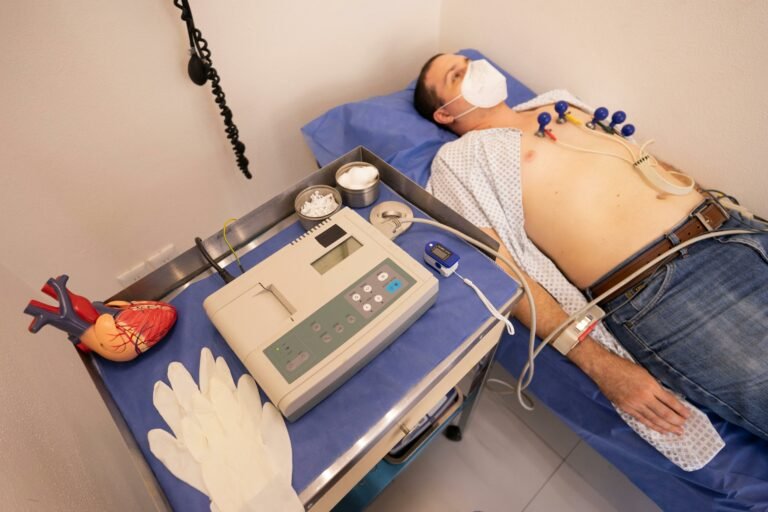Introduction
An abnormal echocardiogram can be alarming, but it doesn’t always mean something is seriously wrong. Understanding the treatment for abnormal echocardiogram results is essential for anyone who has been advised to undergo this test. In this comprehensive article, we’ll explore the possible causes of an abnormal echocardiogram, treatment options available, and how Er of Coppell can help guide you through the process with expert care.
What is an Echocardiogram?
An echocardiogram is a non-invasive test that uses sound waves to produce images of your heart. It’s commonly used to evaluate the heart’s structure, function, and blood flow. By capturing real-time images, doctors can detect a variety of heart conditions, including heart valve issues, heart failure, and congenital heart defects.
Types of Echocardiograms
- Transthoracic Echocardiogram (TTE): The most common type, where the technician applies gel to the chest and uses a device to capture heart images from the outside.
- Transesophageal Echocardiogram (TEE): This test involves inserting a probe into the throat to get a clearer view of the heart from a closer angle.
While both tests are generally painless and non-invasive, they may reveal abnormalities that require further attention.
Why Is My Echocardiogram Abnormal?
An abnormal echocardiogram can indicate various conditions, some mild and others more serious. Some of the most common causes of abnormal results include:
- Heart Valve Problems: Conditions like valve stenosis (narrowing of the valve) or regurgitation (leaking valve) can be detected through an echocardiogram.
- Cardiomyopathy: A condition where the heart muscle becomes enlarged or thickened, making it harder for the heart to pump blood effectively.
- Pericardial Effusion: The accumulation of fluid around the heart, often caused by infection, inflammation, or trauma.
- Congenital Heart Defects: Abnormalities present from birth, such as holes in the heart or abnormal blood flow.
- Aneurysms: Abnormal bulges in the walls of the heart or blood vessels that can lead to severe complications.
Treatment for Abnormal Echocardiogram Results
If your echocardiogram shows abnormal results, your doctor may recommend treatment options based on the specific condition identified. Let’s explore the most common treatments for abnormal echocardiogram findings.
1. Medications
In many cases, medications are the first line of treatment for heart-related issues identified on an echocardiogram. These may include:
- Blood Thinners: To prevent blood clots, especially if there’s a risk of stroke.
- Beta-blockers: To help regulate heart rhythm and lower blood pressure.
- ACE Inhibitors: Medications that relax blood vessels and improve heart function.
- Diuretics: To reduce fluid retention, particularly in cases of heart failure.
- Antiarrhythmic Drugs: These are used to manage abnormal heart rhythms (arrhythmias).
These medications can be highly effective in managing conditions like heart failure, arrhythmias, and high blood pressure, which are commonly detected through an echocardiogram.
2. Lifestyle Modifications
For many heart conditions, especially those identified in the early stages, lifestyle changes can significantly improve heart health. Key modifications include:
- Dietary Changes: A heart-healthy diet, such as the Mediterranean diet, can help lower cholesterol and reduce the risk of heart disease.
- Exercise: Regular physical activity is essential for maintaining cardiovascular health. Consult your doctor for an exercise plan tailored to your condition.
- Stress Management: Reducing stress through techniques like meditation, yoga, and breathing exercises can improve heart function.
- Weight Loss: If you are overweight, losing even a small amount of weight can reduce the strain on your heart.
3. Surgical Interventions
In more severe cases, surgery may be required to address issues identified in an echocardiogram. Some common procedures include:
- Heart Valve Surgery: If an echocardiogram shows that one of your heart valves is not functioning properly, your doctor may recommend valve repair or replacement surgery.
- Coronary Artery Bypass Grafting (CABG): If blocked or narrowed arteries are detected, bypass surgery may be necessary to restore proper blood flow to the heart.
- Aneurysm Repair: If an aneurysm is detected, surgical intervention may be needed to prevent it from rupturing.
- Heart Transplant: In rare cases, when the heart is severely damaged and cannot be repaired, a heart transplant may be necessary.
4. Ongoing Monitoring
Some heart conditions require ongoing monitoring to ensure they are managed properly. For example, if you have an arrhythmia or early-stage heart disease, your doctor may recommend regular echocardiograms to track changes in your heart’s function over time. Monitoring may also include:
- Electrocardiograms (EKG): To track your heart’s electrical activity.
- Blood Tests: To check for markers of heart disease.
- Holter Monitoring: A portable device that records your heart’s rhythm over 24 to 48 hours.
5. Catheter-Based Procedures
In some cases, minimally invasive catheter-based procedures may be used to treat issues identified on an echocardiogram. These include:
- Catheter Ablation: Used to treat abnormal heart rhythms (arrhythmias) by destroying tissue causing irregular heartbeats.
- Percutaneous Valve Repair: A less invasive approach to repairing heart valves using a catheter inserted through a blood vessel.
Why Choose Er of Coppell for Treatment?
At Er of Coppell, we are committed to providing personalized and high-quality care to those with abnormal echocardiogram results. Our state-of-the-art equipment and experienced medical staff ensure accurate diagnoses and effective treatments. Here’s why you should choose us:
- Expert Cardiologists: Our cardiologists specialize in diagnosing and treating heart conditions, offering tailored treatment plans for each patient.
- Cutting-Edge Technology: We use the latest echocardiography and diagnostic technology to ensure that our patients receive the most accurate results.
- Comprehensive Care: From diagnosis to treatment and ongoing monitoring, Er of Coppell provides comprehensive heart care in one location.
FAQs About Treatment for Abnormal Echocardiogram
1. What does an abnormal echocardiogram mean?
An abnormal echocardiogram can indicate a variety of heart-related issues, such as heart valve problems, cardiomyopathy, fluid around the heart, or congenital defects. It’s important to follow up with your healthcare provider to understand the implications.
2. How serious is an abnormal echocardiogram?
The seriousness of an abnormal echocardiogram depends on the underlying condition. Some conditions are mild and manageable with lifestyle changes and medication, while others may require surgery.
3. Will I need surgery if my echocardiogram is abnormal?
Not all abnormal results require surgery. Many conditions can be treated with medication or lifestyle changes. Your doctor will recommend the best treatment based on the specific issue.
4. How long does it take to get treatment after an abnormal echocardiogram?
Treatment plans are typically discussed shortly after the echocardiogram results are reviewed. Depending on the diagnosis, you may begin treatment immediately or undergo additional tests.
5. Can an abnormal echocardiogram be corrected without surgery?
Yes, many heart conditions detected through an echocardiogram can be managed with medications, lifestyle changes, and other non-surgical treatments.
Conclusion
If you’ve had an abnormal echocardiogram, it’s important to remember that it doesn’t always mean you need major intervention. Depending on the results, your doctor may recommend medication, lifestyle changes, or, in some cases, surgical procedures to address the underlying issue. At Er of Coppell, we are dedicated to offering the best possible care and treatment for heart-related conditions, ensuring that you can achieve optimal health and well-being.
For more blogs visit https://empireadda.com/



